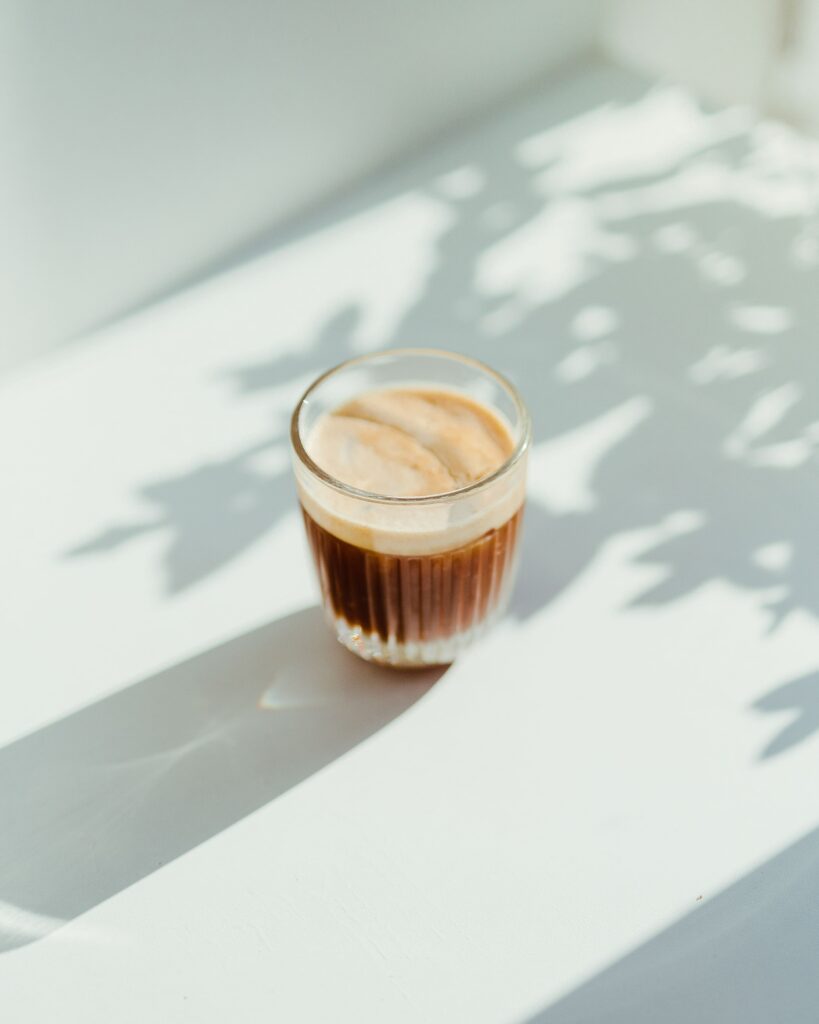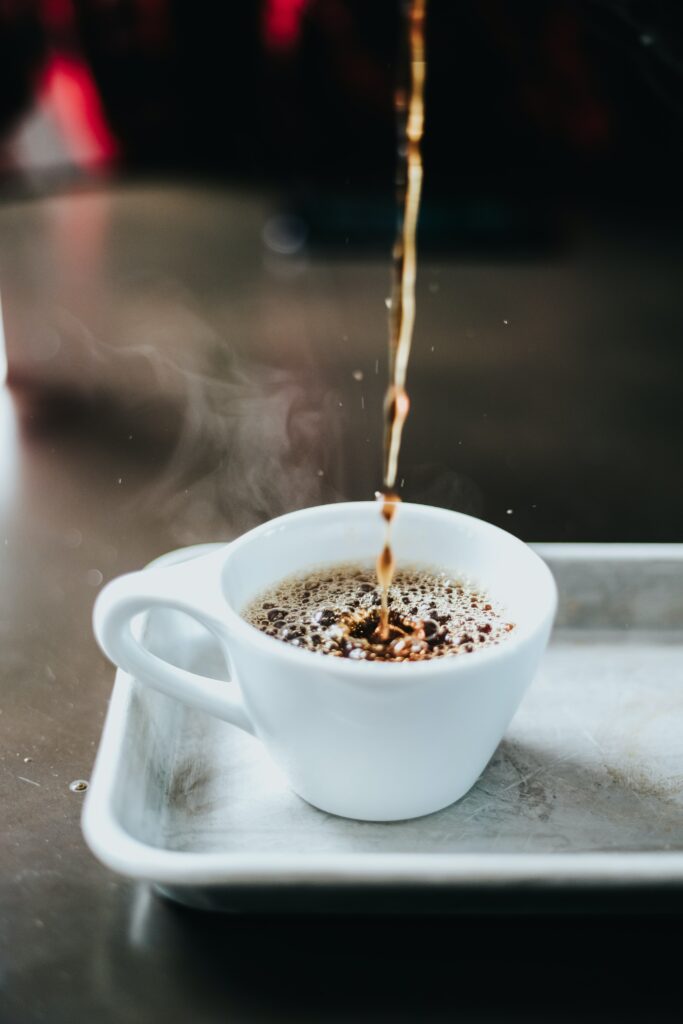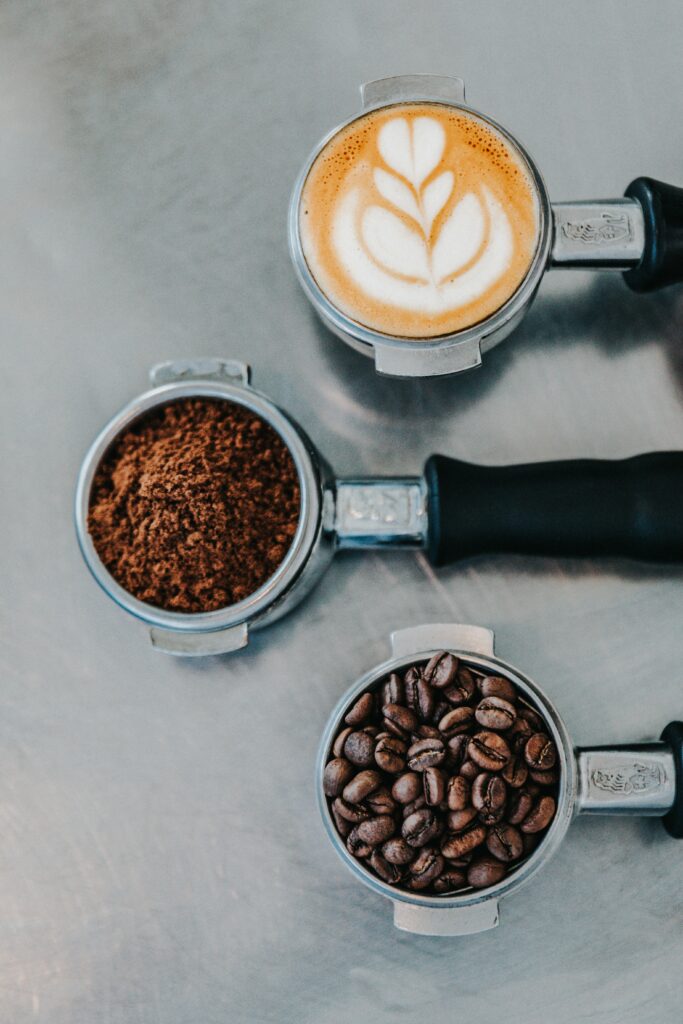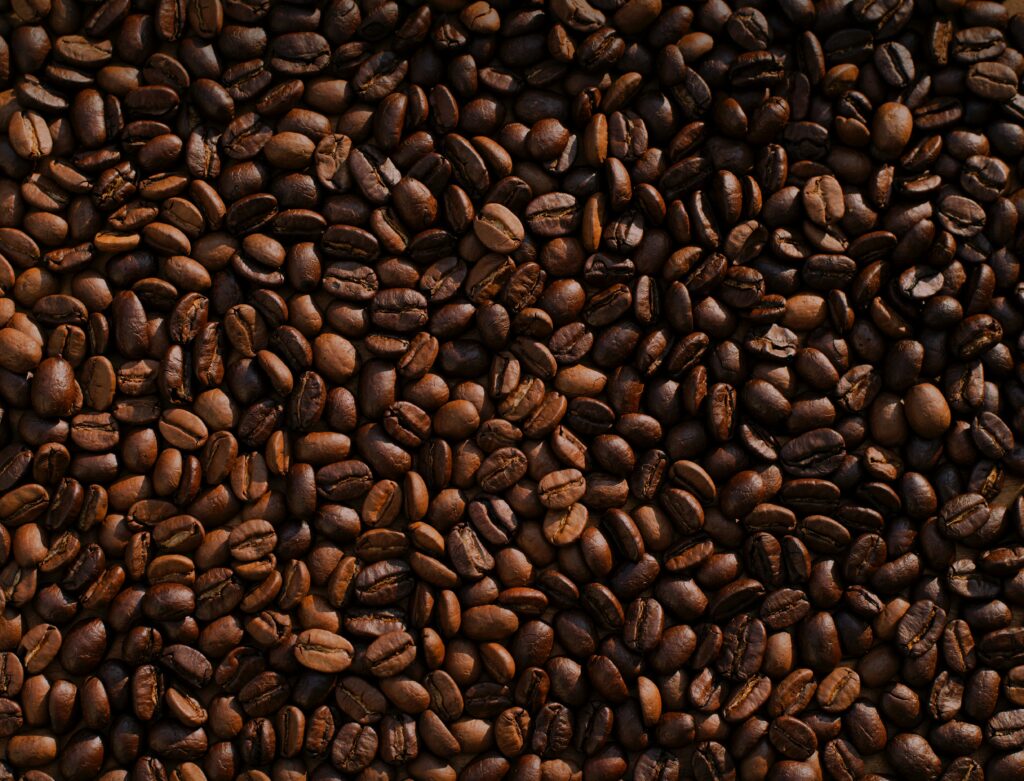There are two types of people in the world: people who love coffee, and people who love coffee but hate its side effects. If you’re like me, pounding more than two cups is a non-stop ticket to caffeine overload. If so, get this. What if I told you there were scientifically-proven, cost-effective ways to make your morning coffee work harder for you? What if you could reduce the jitters and nervousness from coffee, but also amplify the positive side effects of caffeine? Yes, it’s possible. Let me introduce you to a few simple, life-changing concepts—including a mighty compound called l-theanine. Grab your mug—today we’re covering what l-theanine basics (as well as other healthier ways to drink coffee!).

What Is Caffeine?
Every day, billions of people rely on caffeine to wake up, sail through the afternoon slump, or power through a night shift. Working, studying, parenting, or simply running errands are all made easier with a cup of caffeine. A natural stimulant, caffeine works by stimulating the brain and central nervous system. It helps you stay alert. Said differently: caffeine prevents the onset of tiredness. In many ways, your cup of coffee (or soda) acts as an adenosine receptor antagonist. Adeno what? Adenosine is a chemical that promotes sleepiness. As soon as you ingest caffeine, it blocks the adenosine receptor. This keeps you from feeling sleepy.
How Quickly Does Caffeine Affect the Body?
It varies. For most, caffeine begins affecting the body very quickly. It can be felt as soon as 15 minutes after it is consumed. It reaches a peak level in your blood within 30-60 minutes, with a half-life of three to five hours. Meaning, your body can eliminate some of the caffeine within three to five hours, but the remaining amount of caffeine can stay much longer. Ultimately, it depends on if you’re a “fast metabolizer” or a “slow metabolizer.” This all comes down to our genes. The fast group breaks down caffeine more quickly than the slow group. And thus, the effects of caffeine don’t last as long for this group. That said, if you’re implementing healthier ways to drink coffee, you can slow down caffeine’s ticking clock.

Common sources of Caffeine
Caffeine ranks as one of the most commonly consumed dietary ingredients across the globe. It is naturally found in coffee beans (of course!), but it’s also present in cacao beans, kola nuts, guarana berries, and tea leaves (like yerba mate). It can also be made, synthetically. Coffee and tea are the two most prominent sources, but sodas and energy drinks rank high as well. Curious to know how much caffeine is in your shot of espresso? Here’s the gist:
Coffee
1 cup (or 8 ounces) of brewed coffee contains about 95 mg of caffeine. The same amount of instant coffee contains about 60 mg of caffeine. Decaffeinated coffee only contains about 4 mg of caffeine.
Espresso
1 shot or (1.5 ounces of coffee) contains about 65 mg caffeine.
Tea
1 cup of black tea contains about 47 mg caffeine. Green tea contains about 28 mg. Decaffeinated tea contains 2 mg, and herbal tea contains none.
Soda
A 12-ounce can of regular or diet dark cola contains about 40 mg caffeine.
Cacao
1 ounce of dark chocolate contains about 24 mg caffeine, whereas milk chocolate contains much less caffeine.
Energy drinks
1 cup (or 8 ounces) of an energy drink contains about 85 mg caffeine. However, the standard energy drink serving is 16 ounces, which doubles the caffeine to 170 mg. Energy shots are much more concentrated, though. A small, 2-ounce shot contains about 200 mg caffeine.
Supplements
Caffeine supplements contain about 200 mg per tablet or the amount in two cups of brewed coffee.

What Is L-Theanine?
It’s the best of both worlds: Heightened energy with improved mental endurance. L-theanine is an amino acid found primarily in green and black tea. It’s actually responsible for some of the savory notes in green tea. It’s also present, in trace amounts, in some mushrooms. As far as supplements are concerned, it’s available in capsule, powder, or tablet form. In essence, this amino acid is responsible for modulating aspects of brain function. It increases alpha brain wave activity (relaxing the mind without inducing drowsiness), promoting relaxation. It’s known as a nootropic—a cognitive enhancer. In this case, it’s 100% legal. Basically, its most significant benefit is its ability to reduce mental fatigue.
Please consult your doctor or healthcare practitioner before adding l-theanine to your supplement routine.
How Does L-Theanine Help With Caffeine
So, how do the two work hand-in-hand? They’re a power couple. When combined, there’s a pronounced synergistic effect. Think heightened focus, awareness, and energy, as well as reduced stress and improved mental stamina. Studies show it has a significant effect on the general state of mental alertness. With l-theanine, you can turn your morning coffee into a tool. Rather drink matcha? We love it too. Best of all, l-theanine and caffeine can be found in abundance in a simple cup of matcha green tea.
benefits of l-theanine
When it comes to healthier ways to drink coffee, consider l-theanine. when combined with caffeine, it allows the caffeine to induce a feeling of increased concentration over a period of time (compared to caffeine on its own). In essence, the effects of caffeine are being moderated by l-theanine. The more you know.
May Help Cognitive Function
Studies show that l-theanine can boost alpha brain waves—especially in those prone to anxiety. Although it’s an amino acid, l-theanine functions similarly to an adaptogen, in terms of reducing psychological stressors and improving your stress response. For context, when you’re in a stressful situation, your body produces cortisol. And cortisol interferes with your ability to focus and make proper decisions. When you take l-theanine, it can reduce your stress hormone levels so you can focus better. As mentioned, l-theanine offers added nootropic benefits when you combine it with caffeine.
Can Reduce Symptoms of Anxiety
L-theanine is commonly used for relaxation. Double-blind studies have shown that it may be useful in reducing symptoms of anxiety. Interestingly, this supplement is able to help with relaxation without causing drowsiness. The calming effects have been proven for those suffering from generalized anxiety disorders and/or day-to-day anxiety.
Might Support Blood Pressure Management
Speaking of stress, l-theanine may be beneficial for those who experience increased blood pressure in stressful situations. One study found that people who usually experienced higher blood pressure after specific mental tasks found that l-theanine helped reduce an increase in blood pressure. In the same study, the researchers noted that caffeine had a similar but less beneficial effect
Possibly Boost Immunity
Some research suggests that l-theanine may improve the function of the body’s immune system. One study found that l-theanine could help decrease upper respiratory tract infections Another study found that antioxidants in green tea, doubled with l-theanine, could be effective at preventing the flu. More research is necessary, but the initial findings are promising.
Could Improve Sleep Quality
Some research indicates that l-theanine could be beneficial for a good night’s sleep, which could be because it helps to promote relaxation. Researchers in one study found that doses of 250 mg and 400 mg of l-theanine greatly improved sleep in animals and humans. Ultimately, l-theanine is known for its calming, centering, and sleep-boosting abilities.

4 ways to make your coffee healthier
Here are a few tips to help your coffee work for you, not against you. There are plenty of healthier ways to drink coffee!
1. Choose organic coffee beans.
The quality of your beans matters. This goes without saying, but the fewer pesticides you’re consuming, the better. This is healthier for your body (and the planet). Unfortunately, coffee beans tend to be sprayed with synthetic pesticides and other chemicals that were never intended for human consumption. I love Mommee Coffee and Purity Coffee (organic, fair-trade, etc.)—plus, both brands have full-caf, half-caf, and decaf options.
2. Don’t drink it on an empty stomach.
If you experience things like restlessness, jitters, or anxiety after drinking coffee, you’re not alone. According to Frontiers in Psychiatry, there is evidence to back up a correlation between higher caffeine intake and anxiety symptoms for many people. If you’re someone who feels anxious after drinking coffee or are naturally prone to anxiety or panic attacks on a regular basis, the quicker “hit” of caffeine to your bloodstream from drinking your morning cup on an empty stomach might trigger unwanted symptoms. Therefore, be sure to eat your breakfast first.
3. Add protein or healthy fats to your cup.
If you tend to skip breakfast in the morning, this is particularly helpful. By adding protein and / or healthy fats, you’re automatically increasing your daily requirements of those macronutrients. Plus, they aid in sustained and prolonged energy, help manage blood sugar, encourage digestion (coffee can be very acidic!), and can aid in hormone balance.
4. Avoid low-fat or artificial sweeteners.
Speaking of protein and healthy fats, be mindful of other liquids you’re putting in your coffee. Commercial low-fat and artificial creamers are typically highly processed and contain questionable ingredients. Instead of an oat-based creamer, add full-fat cream to your coffee (if you tolerate dairy)—preferably from grass-fed cows. Want your coffee sweeter? Opt for stevia or monk fruit. These keep blood sugar stable.

Images courtesy of Unsplash.
This article contains affiliate links. Thank you for supporting Wellness with Edie!
This article is for informational purposes only. It is not, nor is it intended to be, a substitute for professional medical advice, diagnosis, or treatment and we recommend that you always consult with your healthcare provider.



Leave a Reply